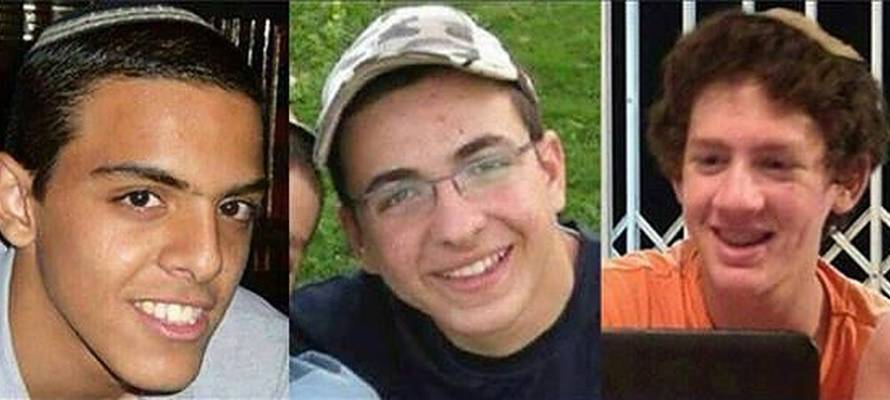The Almagor Victims of Terror Association condemned a new HBO mini-series that twists the events surrounding the 2014 kidnapping and murder of three Israeli boys by Hamas terrorists, making Israel the villain.
By Tzvi Fishman
In addition to denying Democratic congresswomen who hate Israel to enter the country, the Israel Ministry of Interior should consider revoking the Israeli citizenship of the Israel haters who made the HBO TV movie series, “Our Boys,” which deliberately twists the events surrounding the 2014 kidnapping and murder of Eyal Yifrach, Gilad Shaer, and Naftali Fraenkel, into an anti-Israel propaganda film. The 10-episode movie, skillfully crafted by a team of Jewish and Arab filmmakers, will surely aid the enemies of Israel in arousing world sympathy for the Arab struggle against the oppressive Israeli occupation of Palestine.
For over 30 years, I have served as a board member of the Almagor Victims of Terror Association, founded by Meir Indor, and taken part in many of its activities. The organization has written a letter of protest to HBO and to the director, Yosef Cedar, condemning the one-sided production. But for the purposes of this short article, I would like to focus not on the injustice committed against the victimized Jewish families, but rather on the production itself, from the point of view of an experienced screenwriter and film director.
The first thing a screenwriter and director must do is to decide where to start their story. This is a very deliberate decision which will shape the rest of the drama.
In “Our Boys,” the creative team decided not to begin the story in the natural chronological place – following the life of the Jewish families and the three innocent yeshiva boys, leading up to their kidnap and killing. Instead the filmmakers chose to begin their account after their disappearance. Following the young Jewish boys would have created sympathy for the Jews as victims of a horrible murder. Dramatizing the agonizing worry of the families during the almost three-week search for their children would have also automatically created overwhelming empathy for their plight. All of this, the very heart of the drama, is purposefully omitted.
In addition, absolutely nothing is shown about the Arab terrorists who committed the crime. They are never seen or mentioned. Furthermore, the filmmakers made the deliberate decision not to have actors play the roles of the Arab kidnappers and murderers, who would, if done fairly, certainly have come across as evil savages. Likewise, the filmmakers make the deliberate decision not to have actors play out the roles of the young Jewish victims, which would have created viewer identification with them and further sympathy for the Jews. Actors were also not used to dramatize the long ordeal of their parents.
Instead, real documentary footage of Israel TV newscasts is used to describe events in a cold, impersonal, narrative style which never allows the viewer to make an emotional connection with the murdered Jewish victims and their tormented families.
The exact opposite is true regarding the story of the Arab boy who is murdered in an act of revenge shortly after the bodies of the three Jews are discovered. The movie dramatization of the story officially begins with actors playing out the long, drawn-out drama which is focused entirely about the ensuing revenge killing of an Arab boy from easternJerusalem, who is played by a sweet-looking young actor, automatically drawing the viewer’s sympathy for him. An excellent actor dramatizes the role of the Arab boy’s worried father. An experienced actress dramatizes the anxiety of the Arab boy’s mother.
A Largely Sensationalized Fiction
Suddenly the whole story is no longer “Our Boys,” which it never was, but “Our Boy,” a largely sensationalized fiction about the poor oppressed Arab family whose innocent son is brutally murdered by crazed Haredi Jew, portrayed on the screen again and again by an actor, as the filmmakers build the film’s suspense about the murder he is about to commit, turning the fanatic Jew into the bad guy of the movie, along with the hilltop youths who the Jewish Division of the Shabak are closely following.
The actors playing the roles of the hilltop youth do a professional job of convincing us that all young settlers are just as crazy as the young Haredi killer. The scenes involving the Israel Police and Security Forces are dramatized in a constantly negative light, as if the Israeli Authorities are conducting a cover-up, not wanting the truth to be discovered, making all of Israeli society seem responsible for the Arab boy’s murder. The director, Yosef Cedar, has allowed the main actor, playing the role of the investigating Shabak agent of the Jewish Division, only one facial expression throughout every scene, a constant sneer which seems to say, “Everything in Israel is corrupt and evil.”
In short, in this unabashedly leftist Israeli masterminded TV mini-series, the Jews are the villains, and the Arabs are the victims.
When you add to this the very deliberate use of one-sided dramatization, manipulated dialogue, slick camera angles which make the Jews look constantly guilty and the Arabs persecuted, plus professional editing favoring the Arab side of the story, scary music accompanying the Jews and sympathetic music heightening the injustices against the Arabs, with seasoned actors in tear-jerking performances portraying the victimized Arabs and no actors at all playing the three slaughtered Jewish boys and their families, you end up with a movie that is sure to win top awards in Hamas and Islamic Jihad film festivals and Cannes.
Of course, Israel’s Minister of Culture, Mir Regev, will raise her voice in protest, but no positive and truthful movies about the life of Israel’s brave and idealistic settlers will be made, leaving a vacuum for movies like “Our Boys” and their hateful propaganda to thrive.
Tzvi Fishman was awarded the Israel Ministry of Education Prize for Jewish Culture and Creativity. Before making Aliyah to Israel in 1984, he was a successful Hollywood screenwriter. He has co-authored four books with Rabbi David Samson, based on the teachings of Rabbis A. Y. Kook and T. Y. Kook. His other books include: “The Kuzari For Young Readers” and “Tuvia in the Promised Land”. His books are available on Amazon. Recently, he directed the movie, “Stories of Rebbe Nachman.”
Sign the Declaration to Keep Jerusalem United
Jerusalem Must Remain the United Capital of Israel
I declare that Jerusalem is the eternal capital of the Jewish People and support all efforts to maintain and strengthen a united Jerusalem as the undivided capital of the State of Israel.

